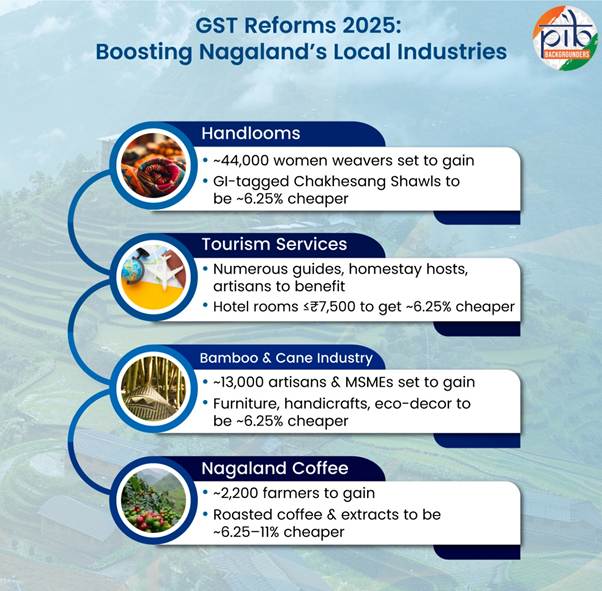PIB Headquarters
GST Reforms 2025: How Nagaland’s Economy Will Gain Across Sectors
Posted On:
15 OCT 2025 10:33AM by PIB Delhi
Key Takeaways
- With GST reduced from 12% to 5%, nearly 44,000 women artisans to see higher earnings and wider reach for Nagaland’s signature shawls and textiles
- Over 13,000 bamboo and cane artisans benefit with 5% GST
- 5% GST makes roasted and extract coffee 6-11% cheaper; 2,200 smallholders and MSMEs to gain
- Hospitality GST cuts to 5% make hotels up to ₹7,500 about 6% cheaper
|
Introduction
Nagaland’s economy is a blend of natural resources and emerging enterprises, with its economy spanning agriculture, handloom, handicrafts, and tourism. The recent GST reforms mark a crucial step toward strengthening the state’s economy by rationalising tax rates across multiple industries. This is expected to make products and services more affordable while improving earnings for local producers and entrepreneurs.
The reforms bring a transformative opportunity for inclusive development, empowering artisans, farmers, and micro-enterprises, positioning Nagaland as a culturally rooted, growing centre for trade and tourism.
Handlooms
Handloom shawls and textiles, including the GI-tagged Chakhesang shawls, contribute to Nagaland’s artisanal economy. The main production clusters are located around Kohima, Phek (Chakhesang), and Dimapur. A state emporium hub has also been recently established in Kohima. The sector is primarily women-led, with weavers working on home-based looms and operating as micro-enterprises. Nearly 44,000 individuals are employed in this sector, sustaining traditional weaving practices.
Products are sold in the apparel and souvenir markets and during cultural events, promoting Nagaland’s heritage globally. Export markets include the USA, UAE, several European countries along with destinations like South Africa, Sweden, and Canada.
With the GST rate on handloom shawls and textiles reduced from 12% to 5%, items priced up to ₹2,500 (earlier the limit was ₹1,000) will now become approximately 6.25% cheaper. This will improve market competitiveness, enhance weavers’ incomes, and support women artisans.

Tourism services
The tourism sector in Nagaland, covering tour operations, hotels, and homestays, is poised to benefit from the GST reforms. The main centres of activity are Kohima, Dimapur, and Kisama’s Hornbill festival, though tourism services are gradually expanding into other districts.
While foreign tourism remains limited, visitors from the Indian diaspora account for a growing share of the total visitors. With the GST rate on hospitality services reduced from 12% to 5%, hotel rooms priced up to ₹7,500 are expected to become about 6.25% cheaper. This will boost affordability and support wider tourism growth statewide.
Bamboo & Cane Products
Nagaland’s bamboo and cane sector is concentrated in the NBRC hubs at Sovima (Chümoukedima) and Dimapur, with bamboo clusters spread across various districts. The Nagaland Bamboo Development Agency (NBDA), active since 2004, has been instrumental in promoting bamboo-based industries. The sector employs around 13,000 people comprising artisan-led MSMEs, household industries, and village carpenters.
The products are used widely in domestic markets, catering to the growing demand for furniture, handicrafts and eco-friendly decor. With the GST rate on furniture and handicrafts reduced from 12% to 5%, prices are expected to fall by 6.25%, increasing affordability and artisanal incomes.
Nagaland Coffee
The GST reforms have brewed fresh opportunities for Nagaland Coffee, with rates on roasted beans reduced from 12% to 5% and on coffee extracts from 18% to 5%. The industry is spread state-wide with legacy and active zones in Mokokchung, Wokha, Mon, Zunheboto, and Tuensang. The sector is driven by tribal smallholders cultivating shade-grown plots and a growing number of MSMEs engaged in roasting and retailing. As of 2022-23, there were nearly 2,200 registered coffee growers in Nagaland.
Nagaland coffee has carved a niche in both domestic and international markets, exporting to countries such as South Africa, Bahrain, UAE, Germany, Italy, Netherlands, and across Southeast Asia. Green beans are typically sold to traders, while roasted beans are supplied to cafes and specialty buyers. The recent GST reduction is expected to lower overall costs by 6.25% to 11%, making Nagaland coffee more price-competitive and profitable for growers and MSMEs.
Conclusion
Nagaland’s diverse economy, deeply rooted in its artisanal traditions and agriculture, stands to benefit significantly from the recent GST reforms. The reforms directly impact affordability, competitiveness, and market access for local producers and entrepreneurs.
The state’s coffee growers, handloom weavers, bamboo artisans, and hospitality operators stand to gain from more competitive pricing. Overall, these reforms will support and strengthen Nagaland’s cultural and ecological heritage.
Click here to see PDF
****
VV/M
(Release ID: 2179211)
Visitor Counter : 898